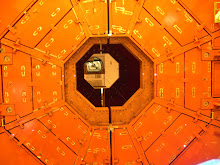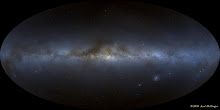 On the left, the Orloj in Prague's Town Hall, the upper astrolabe mechanism from 1410. A Ptolemaic Astronomy that fit right in with Astrology. It's the most complex piece of machinery ever built until modern times, and one of the oldest town clocks. You could say modern Science started around this time, the building of clocks to measure Time. It was mechanical clocks like this that got Da Vinci thinking. Coincidentally that other branch of Science, Chemistry, had also developed into an obsession by then among the Alchemists who laid the foundations of Chemistry in secret. And why? Ostensibly the method of transmutation of base metals into gold was what they were hiding, but I'd say that was their cover story, one that could get them some financing for their costly equipment and experiments, and so a fable they would need to keep very secret. Other secrets too, we know little about. Prague was a hotbed of Alchemists for 300 years! Perhaps their Mysticism was it, another religion of pagan and Christian elements that the Church would have condemned along with any original scientific thinking, as Galileo found out. Come to think about it, perhaps the Church's objections had much to do with how hard Copernicus' theory, reiterated by Galileo, knocked Astrology, as well as the Earth at the Center of the Heavens. Apart from the gilt-edged sciences of Geometry and Mathematics, and based on them, the Science of Astrology was about the only other Science for centuries. In any case the Princes of Europe had their Court Astrologers and soon added Court Alchemists. A wily one, Augustus the Strong, tired of waiting for the promised gold in abundance, commandeered his Alchemist, Bottger, to make Chinese Porcelain instead. What we got was Meissen Porcelain which made a fortune for Saxony. From now on with government support and funding, Science became unstoppable. Read The Arcanum by Janet Gleeson, Warner Books, 1998.
On the left, the Orloj in Prague's Town Hall, the upper astrolabe mechanism from 1410. A Ptolemaic Astronomy that fit right in with Astrology. It's the most complex piece of machinery ever built until modern times, and one of the oldest town clocks. You could say modern Science started around this time, the building of clocks to measure Time. It was mechanical clocks like this that got Da Vinci thinking. Coincidentally that other branch of Science, Chemistry, had also developed into an obsession by then among the Alchemists who laid the foundations of Chemistry in secret. And why? Ostensibly the method of transmutation of base metals into gold was what they were hiding, but I'd say that was their cover story, one that could get them some financing for their costly equipment and experiments, and so a fable they would need to keep very secret. Other secrets too, we know little about. Prague was a hotbed of Alchemists for 300 years! Perhaps their Mysticism was it, another religion of pagan and Christian elements that the Church would have condemned along with any original scientific thinking, as Galileo found out. Come to think about it, perhaps the Church's objections had much to do with how hard Copernicus' theory, reiterated by Galileo, knocked Astrology, as well as the Earth at the Center of the Heavens. Apart from the gilt-edged sciences of Geometry and Mathematics, and based on them, the Science of Astrology was about the only other Science for centuries. In any case the Princes of Europe had their Court Astrologers and soon added Court Alchemists. A wily one, Augustus the Strong, tired of waiting for the promised gold in abundance, commandeered his Alchemist, Bottger, to make Chinese Porcelain instead. What we got was Meissen Porcelain which made a fortune for Saxony. From now on with government support and funding, Science became unstoppable. Read The Arcanum by Janet Gleeson, Warner Books, 1998.The odd coda to the beginnings of Modern Astronomy and Chemistry is the lack of interest contemporary scientists have for their own history. Perhaps they're embarrassed at their magical origins. A considerable body of ancient books and manuscripts lie undisturbed about our libraries. Doubly difficult to make sense of them now, written in some arcane code for those who know, and mostly in Latin.
 Cointrin
Cointrin

























No comments:
Post a Comment